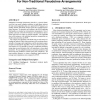Free Online Productivity Tools
i2Speak
i2Symbol
i2OCR
iTex2Img
iWeb2Print
iWeb2Shot
i2Type
iPdf2Split
iPdf2Merge
i2Bopomofo
i2Arabic
i2Style
i2Image
i2PDF
iLatex2Rtf
Sci2ools
ATAL
2007
Springer
2007
Springer
A complete distributed constraint optimization method for non-traditional pseudotree arrangements
Distributed Constraint Optimization (DCOP) is a general framework that can model complex problems in multi-agent systems. Several current algorithms that solve general DCOP instances, including ADOPT and DPOP, arrange agents into a traditional pseudotree structure. We introduce an extension to the DPOP algorithm that handles an extended set of pseudotree arrangements. Our algorithm correctly solves DCOP instances for pseudotrees that include edges between nodes in separate branches. The algorithm also solves instances with traditional pseudotree arrangements using the same procedure as DPOP. We compare our algorithm with DPOP using several metrics including the induced width of the pseudotrees, the maximum dimensionality of messages and computation, and the maximum sequential path cost through the algorithm. We prove that for some problem instances it is not possible to generate a traditional pseudotree using edge-traversal heuristics that will outperform a cross-edged pseudotree. We ...
| Added | 07 Jun 2010 |
| Updated | 07 Jun 2010 |
| Type | Conference |
| Year | 2007 |
| Where | ATAL |
| Authors | James Atlas, Keith Decker |
Comments (0)

